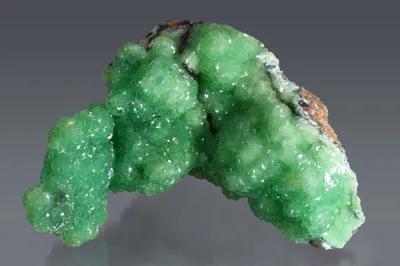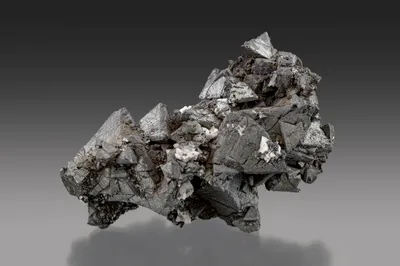Mineral Species
Serpierite
Type Locality
No
Composition
Ca(Cu,Zn)4(SO4)2(OH)6·3H2O
Crystal System
Monoclinic
Status at Tsumeb
Believed valid
Abundance
Somewhat rare
Distribution
First (?), second and third (?) oxidation zones
Paragenesis
Supergene
Entry Number
Species; TSNB317
General Notes
Somewhat inconspicuous, serpierite occurs as tiny white, whitish-blue, or blue-green scaly crystals associated with other sulphate minerals on oxidising surfaces of sulphide minerals. Serpierite is a member of the devilline group of minerals and several authors have cautioned that serpierite and devilline are difficult to distinguish from one another.
Bartelke (1976) provided the earliest published record of "devilline-serpierite" at Tsumeb, although Paar (1973) had noted the presence of langite with "… devilline … brochantite and a bluish-white mineral … whose examination has not yet been completed …" on the oxidising surfaces of tennantite pseudomorphs after enargite.
Pinch and Wilson (1977) stated that serpierite "… has been observed as very thin, light blue-green to white, glossy scales covering posnjakite and brochantite".
Keller (1977a) included serpierite as the youngest mineral in a paragenetic sequence of (mainly) sulphate minerals which he believed formed under acidic conditions. His sequence "II/3" is as follows:
II/3: primary sulphides >> brochantite + posnjakite + malachite >> linarite >> serpierite
Keller (1984) repeated this sequence but replaced "serpierite" with "serpierite-devilline", emphasising the difficulty of distinguishing these two minerals. He noted specifically that this sequence typically forms on the surface of tennantite pseudomorphs after enargite.
Lombaard et al. (1986) listed serpierite as "rare" at Tsumeb.
Gebhard (1999) also emphasised the difficulty of distinguishing serpierite and devilline on the surfaces of tennantite pseudomorphs after enargite.
Associated Minerals
anglesite; brochantite; cerussite; connellite; devilline; enargite; langite; linarite; malachite; posnjakite; smithsonite; tennantite-(Zn); wulfenite
Pseudomorphs
Serpierite is reported to form pseudomorphs after the following minerals: tennantite (rare).


